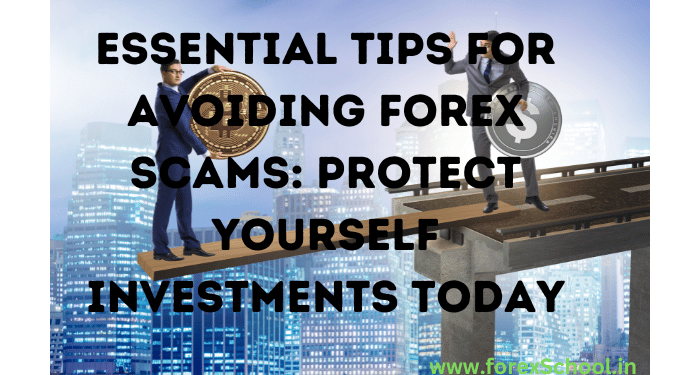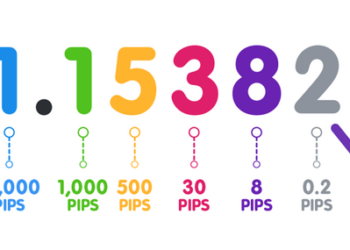To avoid Forex scams, always research and choose regulated brokers, and be cautious of promises that seem too good to be true.
Protecting yourself from Forex scams is essential in the world of online trading. With the lure of quick profits, many unsuspecting individuals fall victim to fraudulent schemes promising unrealistically high returns. To avoid Forex scams, it’s crucial to conduct thorough research on brokers, use reputable trading platforms, and be wary of too-good-to-be-true offers. Staying informed and skeptical can be your best defense against these deceitful practices in the Forex market.
Introduction
Forex trading, short for foreign exchange trading, can be a lucrative venture if done right. However, it’s also a field ripe for scams and fraudulent activities. In this blog post, we’ll guide you through the world of Forex scams in easy-to-understand language. We’ll help you identify the red flags and provide practical tips on how to prevent falling victim to these scams. So, let’s dive into the world of Forex and arm ourselves with knowledge to safeguard our hard-earned money.
Chapter 1: Understanding Forex Trading
Before we delve into identifying and preventing Forex scams, let’s briefly understand what Forex trading is. Forex trading involves buying and selling currencies in the foreign exchange market to make a profit. It’s the largest financial market in the world, with a daily trading volume exceeding $6 trillion. To engage in Forex trading, you typically need a broker, a trading account, and some capital.
Chapter 2: The Attraction of Forex Scams

Forex scams are attractive to fraudsters because of the potential for high profits and the lure of easy money. They prey on the ignorance and greed of unsuspecting individuals. It’s crucial to recognize their tactics to avoid becoming a victim.
Understanding Regulations in Forex Market: A Comprehensive Guide
Chapter 3: Red Flag of Forex Scams

Identifying Forex scams is the first step in protecting yourself. Here are some common red flags to watch out for:
Unrealistic Promises: Be wary of schemes promising guaranteed profits or high returns with little to no risk. If it sounds too good to be true, it probably is.
Unregulated Brokers: Ensure your Forex broker is registered and regulated by a reputable financial authority. Scammers often operate without proper oversight.
Pressure to Invest Quickly: Scammers may pressure you to invest colossal sums of money quickly. Legitimate brokers will provide information and allow you to make informed decisions.
Lack of transparency: If the broker is vague about their fees, trading strategies, or the company’s background, it’s a red flag.
Poor Customer Support: Legitimate brokers provide reliable customer support. If you struggle to get in touch or receive vague responses, be cautious.
Chapter 4: Research and Due Diligence
Preventing Forex scams requires thorough research. Here’s what you should do:
Check Regulation: Verify the broker’s regulatory status with the financial authorities, such as the U.S. Commodity Futures Trading Commission (CFTC) or the UK Financial Conduct Authority (FCA).
Read Reviews: Look for online reviews and testimonials from other traders. Actual experiences can offer valuable insights.
Demo Accounts: Many brokers offer demo accounts. Use them to practice and get a feel for the platform before committing real money.
Compare Fees: Understand the fee structure. Some brokers charge high spreads or hidden fees.
Chapter 5: Secure Your Investments

Once you’ve identified a legitimate Forex broker, it’s crucial to secure your investments:
Use Strong Passwords: Create complex passwords for your trading accounts and change them regularly.
Two-Factor Authentication (2FA): Enable 2FA for an extra layer of security.
Secure Your Devices: Ensure your computer and mobile devices have up-to-date antivirus software.
Regularly Monitor Your Accounts: Keep a close eye on your trading accounts for any suspicious activity.
Chapter 6: Educate Yourself
Education is your best defense against Forex scams. Take the time to learn about Forex trading and financial markets. Understand the risks involved and only invest what you can afford to lose. Many reputable sources and educational courses are available to help you gain knowledge and skills.
Chapter 7: Report Suspected Scams
If you encounter a potential Forex scam or have been a victim, report it immediately to the relevant authorities. This not only helps protect yourself, but also prevents others from falling into the same trap. Contact your local financial regulatory agency and provide them with all the information you have.
To summarize, here are the 8 simple questions to ask yourself when considering a broker to trade forex or CFDs:
- Is the broker regulated?
- If regulated, how trustworthy is the regulatory body?
- Is the broker offering profits or rewards for signing up?
- Is the broker offering big cash bonuses for signing up?
- Is the broker offering automatic trades or signals to guarantee profits?
- Is any credible information about the company included on its website, such as company history, financials, headquarters’ address, or similar?
- If awards are cited, can I verify their authenticity?
- If a big corporate sponsorship is referenced, am I doing my due diligence to ensure the company can be trusted?
NOTE – Binary options are a complete scam and should never be traded.
Conclusion
Forex trading offers exciting opportunities for investors, but it’s essential to remain vigilant and informed. By understanding the red flags of Forex scams, conducting thorough research, securing your investments, and continuing your education, you can significantly reduce the risk of falling victim to fraudulent schemes. Remember, in the world of Forex, knowledge is your most potent weapon against scams. Stay safe, stay informed, and protect your hard-earned money.
Questions and Answer about Forex Scams

1. Who do I contact if I suspect fraud?
There are specific organisations depending on your location. You can find the list below.
United States:
United Kingdom:
Australia:
Cyprus:
Singapore:
2. Is OctaFX trading legit?
OctaFX is a forex broker that has been in operation since 2011. As of my last knowledge update in September 2021, OctaFX was a well-known broker in the industry. However, whether OctaFX is considered “legit” can depend on various factors and may change.
To determine the current status and reputation of OctaFX, I recommend conducting up-to-date research, checking their regulatory status, reading recent reviews, and ensuring they meet your specific trading needs and preferences. Keep in mind that the forex market can be risky, so it’s essential to choose a broker carefully and trade responsibly.
3. Is Exness trading legit?
As of my last knowledge, Exness was a well-established forex broker that had been in operation for several years. However, whether Exness is considered “legit” can depend on various factors and may change.
In the vast landscape of online forex trading, finding a reliable and reputable broker is essential for success. Exness, a well-established name in the industry, has been serving traders for years from 2008. In this comprehensive review, we’ll inspect Exness, examining its features, trading conditions, regulatory status, and overall reputation. By the end of this article, you’ll clearly understand what Exness offers and whether it suits your trading needs.





